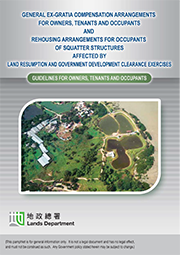Ex-gratia Compensation and Rehousing - Introduction Video, Pamphlet and Frequently Asked Questions
In May 2018, the Development Bureau announced measures to revise the ex-gratia compensation and rehousing (C&R) arrangements for domestic occupants in squatter structures and business undertakings affected by government development clearance exercises. On 18 July 2018, the Finance Committee of the Legislative Council (FC) endorsed the new measures, under which enhancements are made to the ex-gratia compensation applicable to affected and eligible domestic occupants in squatter structures and business undertakings. In parallel, the Government also implemented the newly introduced rehousing arrangements. On 3 May 2022, the Development Bureau further announced measures to enhance the ex-gratia compensation arrangements for landowners and business operators affected by land resumption and clearance projects of the Government. On 27 May 2022, the FC endorsed the relevant enhancement measures for implementation.
Please refer to the introduction video (Chinese Version Only) and pamphlet below to find out more about the general ex-gratia C&R arrangements.
With the "people-oriented" philosophy as well as the principle of fairness and reasonableness in mind, the Government will, without prejudice to the overall policy directions, exercise some flexibility as set out below for domestic occupants in squatter structures and business undertakings affected by Government development clearance exercises :
| (a) | consecutive continuous occupation of different surveyed/licenced structures or lots (for open-air/outdoor business undertakings) by domestic occupants in squatter structures or business undertakings in the same affected area (i.e. within the boundary of the area to be cleared for development) may be counted towards the minimum continuous residence/occupation period immediately preceding the date of the Pre-clearance Survey (PCS); |
| (b) | for development projects for which the PCS had already been completed before the announcement of the enhanced ex-gratia C&R package on 10 May 2018, we will take a more lenient approach in assessing the minimum continuous residence/occupation duration of domestic occupants in squatter structures and business undertakings for determining the eligibility for ex-gratia allowances (EGAs) and/or rehousing arrangements by counting not only the length of continuous residence/occupation immediately preceding the date of the PCS but also that after the date of the PCS to 10 May 2018 (i.e. the announcement date of the enhanced ex-gratia C&R package); |
| (c) | for households registered in the PCS but subsequently evicted from surveyed/licenced structures by lot owners (or those who claimed to be owners) before the actual clearance, we have in place a discretionary mechanism allowing them to apply to the Director of Lands for ex-gratia C&R arrangements on compassionate grounds. The concerned households have to fulfil the same eligibility criteria for ex-gratia C&R arrangements applicable to other households residing in surveyed squatter structures/licenced structures, and have to demonstrate to the satisfaction of the Director of Lands that their eviction was due to circumstances beyond their control and that they have not received other forms of compensation/rehousing as a result of their eviction; and |
| (d) | for New Development Area projects or other large-scale development projects to be implemented by phases over an extended period of time, the Government may, having regard to the circumstances of the relevant project, allow eligible households affected by clearances in the later phases of those projects to voluntarily apply for early departure from and surrender of their squatter structures, and in turn, early application for the ex-gratia C&R package. This arrangement takes into account the concerns expressed by households to be affected by clearances in the later phases about their having to stay in the vicinity of works areas once the earlier phases of construction have commenced, and about the breaking up of a coherent community. For practical considerations, whether and if yes how the applications would be entertained will be subject to capacity (e.g. whether rehousing units are available ahead of the original due date) and prioritisation of claims (e.g. those closer to the first phase should be given priority). |



